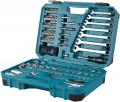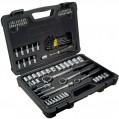Total number of items
The total number of core items included in the set.
In this case, the main items are all devices that are directly used during work: non-separable tools (traditional wrenches, hammers, pliers ...), elements of collapsible tools (for example, a ratchet for removable heads and 5 such heads will be considered 6 units) , as well as accessories (such as extensions or universal joints). Additional accessories — such as lights — may or may not be included in this count, depending on the manufacturer; however, there are usually few such accessories, and they do not fundamentally affect the total number of items.
The most modest modern tool kits include
up to 25 units. However, such kits are very popular — they are inexpensive and at the same time can be very versatile.
25 – 50 items is still quite a small number,
50 – 75 pcs can be called an average,
76 – 100 items are more than average, and the most extensive modern sets can include
100 – 150 items or even
more.
The general rules for choosing this parameter are obvious: a more extensive set, usually, is more multifunctional, but more expensive, weighs more and takes up more space. It is also worth bearing in mind that with a similar number of items, the specific assortment of these items in differ
...ent sets may be different; so when choosing, it is worth specifying not only the number of tools, but also their specific composition.Square drive size
The size of the "seat" for which the socket heads included in the package are designed (see below), in other words, the size of the square hole on the back of the head used for installation on a ratchet, wrench or other similar tool. Accordingly, the tool for working with heads supplied in the kit has the same dimensions of the landing square; and in the absence of such tools in the kit, data on the size of the heads will be useful for its selection.
There is a generally accepted standard for these sizes, providing for the designation in fractions of an inch — from 1/4 "to 1". Thanks to this, heads and tools from different sets can be quite compatible — just matching in size is enough. Most often in modern hand sets there are options in 1/4 "and 1/2", a little less often — 3/4" and 3/8". Some sets include several variants of the landing square at once.
Socket heads (6 points)
Number of
hex sockets included in the tool kit.
All end heads are accessories for a collapsible tool; during operation, they are mounted on a ratchet, wrench or other similar device. The head itself has the appearance of a characteristic “cap”, which, during operation, is put on a bolt, nut, etc. This design, among other things, allows you to work with parts located in recesses and some other hard-to-reach places that cannot be reached with open-ended, captive or split keys. And compared to a set of classic socket wrenches, the holder plus socket set takes up much less space, providing almost the same functionality.
As for the 6 faces, this type of socket head is the most famous and widespread, because. most modern nuts and bolts have this shape.
Socket heads sizes (6 points)
Working size range of hex sockets (see above) supplied with the kit. This parameter allows you to evaluate how the heads fit the dimensions of the fasteners with which they are planned to be used.
Socket heads (E-profile)
The number
of E-profile sockets supplied with the tool kit.
All end heads are accessories for a collapsible tool; during operation, they are mounted on a ratchet, wrench or other similar device. The head itself has the appearance of a characteristic “cap”, which, during operation, is put on a bolt, nut, etc. This design, among other things, allows you to work with parts located in recesses and some other hard-to-reach places that cannot be reached with open-ended, captive or split keys. And compared to a set of classic socket wrenches, the holder plus socket set takes up much less space, providing almost the same functionality.
Specifically, this type of heads has a working part in the form of a six-pointed star, which is why such nozzles are also called “asterisks”, “Torx” or “internal Torx”. The latter option is used to avoid confusion with Torx keys (see above): the working part of such a key (“external Torx”) has the form of a star-shaped rod, while in the end head the working part has the form of a recess with similar outlines. As for the use of such heads, when used with “native” fasteners, the E-profile allows you to work at high forces without much risk of breaking the edges; and fasteners are used for such tools, in particular, in cars.
Socket heads sizes (E-profile)
Working size range of E-profile sockets (see above) supplied with the kit. This parameter allows you to evaluate how the heads fit the dimensions of the fasteners with which they are planned to be used.
Spark plug sockets
The number of
spark plug heads supplied with the tool kit.
Like all interchangeable heads, candlesticks are put on the appropriate device during operation — for example, a ratchet (see above) or a tap wrench (see below). The specifics of their use is reflected in the name: the main purpose of this type of nozzle is the installation and dismantling of spark plugs in automobile engines. By design, spark plug sockets are generally similar to end heads, but they are much longer — otherwise working with candles would be impossible.
There is no single standard for fastening modern spark plugs, so several spark plug heads can be supplied in a set. At the same time, note that with the same number of such accessories, their specific types in different sets may be different; this nuance needs to be clarified before buying.
Bits
The number of
bits supplied with the tool kit.
A bat in this case is called a working nozzle, which plays the role of a screwdriver tip; in fact, they are most often used with screwdriver handles (see above).
Many types of splines (slots) are used in modern fasteners — starting with the well-known
straight, cross-shaped (
Phillips and
Pozidriv),
Torx sprockets and ending with exotics like Torq-set (a cross with lines shifted from the centre), Pentalobe (with five ledges), etc. .P. In addition, the size of the slots can also vary, and in many cases, tool matching in size is very important. Accordingly, the more bits supplied with the set, the more versatile it is, the higher the probability that it will contain a nozzle of the desired type and size. However, the specific list of bits in the kit also does not hurt to clarify — in order to make sure that it has all the varieties you need. In the characteristics of individual sets, these data are given in the paragraph "Bit sizes" (see below).
Bit sizes
Varieties of bits (see above) included in the set.
Note that this paragraph specifies not just the size, but also the type of slot for which this or that bit is designed. This type is indicated by a letter index followed by a number describing the size — for example, SL5. Here are the most popular designations found in modern bits:
— SL. Flat bits for straight slot. The size is indicated in millimetres.
— Ph. Classic cross bits. The size is indicated by a conditional number.
— P.Z. Bits for a modified cross slot with improved engagement, have additional edges. The size is indicated by a conditional number.
— TX, T. Torx bits, with six-pointed sprocket tips. The size is indicated by a conditional number.
— H. Hex bits, with hex tips. The size is indicated in millimetres.
If there is more than one bit of a certain type in the set, the number is specified after the designation, for example, PH2x2.

